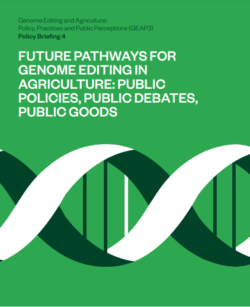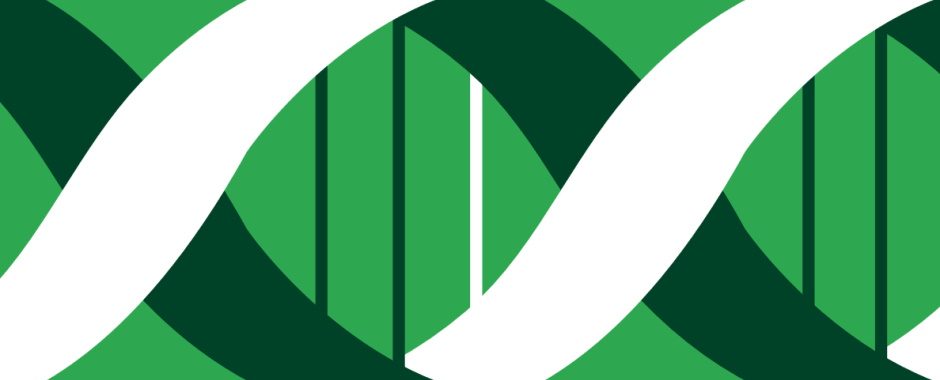A new policy briefing on genome editing discusses choices and dilemmas facing policy makers and societal stakeholders in the European Union and the United Kingdom.
The UK is considering changing its rules on ‘genome editing’ of crops, which would mean these technologies would be less tightly regulated than in the EU. A public consultation ends on 17 March. Meanwhile, the EU is reviewing its own rules on new genomic techniques, and is expected to report its findings at the end of April.
In a new briefing from the project ‘Genome Editing and Agriculture: Policies, Practices and Public Perceptions’ (GEAP3), we explore the issues facing policy makers. What could these choices mean for farmers, consumers and international relationships of trade, aid and technical cooperation?
What’s new about genome editing?
Genome editing involves the alteration of an organism’s genetic structure by adding, deleting, changing or replacing individual nucleotides or sequences of DNA.
Proponents say that genome editing is a more precise and sophisticated technique compared to previous methods of genetic modification (GM), which will allow plant breeders to develop improved crop varieties more quickly and reliably. However, the attribute of ‘precision’ can mean different things to different stakeholders.
Some public commentators and policy makers have grasped the idea that more precision on a molecular scale implies greater control, certainty and safety. Others contend that that inference is mistaken: they point out that molecular precision does not necessarily imply safety on the levels of the organism, the crop, ecology or society.
What happens if regulation changes?
The way genome editing is regulated could have big consequences for agricultural and food systems in Europe, including the UK.
As current disruptions to post-Brexit trade are showing, trade between jurisdictions that operate different rules can cause problems at border points and shape flows of goods moving between markets. This has consequences for producers, traders and consumers.
This isn’t just about Europe: the rules adopted by major food importers, such as the EU and the UK, will have implications for producers and exporters in other countries, including farmers in sub-Saharan Africa, who grow produce for European supermarkets.
Asking the right questions
So how should society proceed with genome editing in agriculture? The new briefing expands on these questions and poses a series of questions for policy makers.
They include:
- How will new rules on genome edited crops take account of public concerns and values?
- Could or should the developers of genome edited crops be required to show a social benefit in order to get clearance for their new varieties?
- Whose job is it to monitor for unintended side-effects of genome editing in plants, the environment or foods, and how can we make sure they are performing this task?
- If the projected benefits of a new crop technology do not materialise, or are unevenly distributed, or come with serious side-effects, who is accountable for that?
- Is it possible for ‘genetically engineered’ and ‘conventional’ crops to co-exist on farms and in markets? How would this be accomplished and enforced, in practice?
For more detail, read the new briefing:
 Future pathways for genome editing in agriculture: public policies, public debates, public goods
Future pathways for genome editing in agriculture: public policies, public debates, public goods
GEAP3 Policy Briefing 4
by Dominic Glover, Beate Friedrich, Adrian Ely, Angela Noland and Alexandra Lidstone
March 2021
Find out more
Briefings
Three previous briefings looked at aspects of genome editing, policy and regulation in the EU and UK, taking into account international relations.
- Briefing 1 looked at technical and ethical differences and similarities between genome edited organisms and other genetically engineered products.
- Briefing 2 looked at the politics of policy around genome editing in agriculture in the EU.
- Briefing 3 assessed the prospects for agricultural genome editing in the UK after Brexit.
Blog posts
We also published two other blog posts that looked at genome editing regulation in the UK after Brexit.
Video: online debate – Genome editing, politics and policy
An online discussion in October 2020 about key issues in the governance of genome editing of organisms in the European Union, the United Kingdom, and beyond (128 minutes).
More from the Geap3 network
The GEAP3 network continues its work in two other Hubs: one on agricultural practices and one on public perceptions, attitudes and values.
For updates and full information, see the GEAP3 website and follow the network on Twitter at @GEAP_3.
The GEAP3 network is a Jean Monnet network supported by Erasmus Plus and involves a collaboration between the Institute of Development Studies (IDS), Brighton, the Science Policy Research Unit at the University of Sussex (SPRU), Dalhousie University, the African Centre for Technology Studies, Washington University in St. Louis and the Swedish University of Agricultural Sciences.
Graphic: Barney Haward / The Alpine Room
